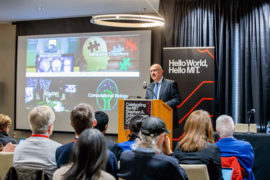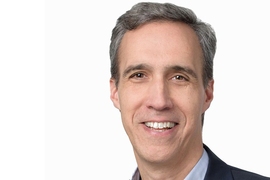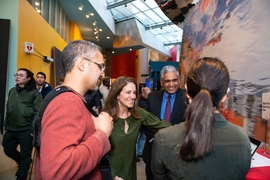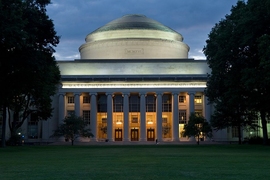The expanding role of computer science education — in every discipline from engineering to the arts — took center stage on Wednesday, Feb. 27, as MIT continued its three-day celebration of the new MIT Stephen A. Schwarzman College of Computing.
More than 300 people filled the Samberg Conference Center for Teach: The Academic Symposium, which featured two keynote addresses and five panel discussions on topics ranging from “Teaching Ethics and Policy in Computer Science” to “Teaching Computer Science to All.”
The day began with welcoming remarks from Provost Martin A. Schmidt, the Ray and Maria Stata Professor of Electrical Engineering and Computer Science (EECS), who described the Schwarzman College as a “transformative opportunity” for MIT.
“In creating something new, we have a clean sheet of paper,” said Schmidt, who later expanded on his comments in a discussion with reporters. “I am confident that what we learn today will indeed shape the creation of the college.”
Schmidt then introduced Farnam Jahanian, president of Carnegie Mellon University, who offered the day’s opening keynote address, “The Future of Higher Education in the Age of Disruption.” He was the first of nearly 30 speakers, who hailed from across MIT as well as from a wide range of other universities, including Columbia University, Cornell University, Georgia Tech, Harvard University, and Stanford University.
Jahanian described the societal changes being wrought by computing advances as unprecedented and pointed out that major technological changes have historically led to innovations in higher education. “The pace of innovation is accelerating dramatically,” he said. “Society, including our education system, must adapt to this new paradigm.”
The increasing demands for an educated workforce and the changing nature of work call for new thinking about how students acquire computing skills, he said. “We’re seeing a shift from an industrial, transactional model of education based on a rigid model to a much more personalized, outcome-based model,” Jahanian said. “Computer scientists have to take a much more expansive but inclusive view of computing.”
The discussions that followed provided a glimpse of such a view, including the panel on teaching computing in arts and humanities, which was moderated by Agustín Rayo, associate dean of the School of Humanities, Arts, and Social Sciences. Featuring MIT faculty from EECS, the Music and Theater Arts Section, and the Department of Economics as well as a computer scientist from Cornell, the panel underscored the synergies between computer science and other fields.
For example, Eran Egozy, a professor of the practice in music technology, gave a lively demonstration of how students in his class can create music with code. And EECS Professor Erik Demaine described using computation to create origami and blown glass.
“The future of the humanities depends on our ability to bring in computational resources, and the ability of computer science to effect societal change depends on bringing humanities to the table,” said Michael Scott Cuthbert, associate professor of music and the director of Digital Humanities at MIT. “I think both futures at MIT are very bright.”
The value of interdisciplinary connections — a central theme of the day — was picked up by the next panel. Moderated by David Autor, Ford Professor Economics, the panel focused on ways to incorporate the teaching of ethics and policy in computer science.
“We should have ethics throughout the computer science curriculum so that [students] think about ethical implication of their designs at the same time they think about writing elegant code and efficient code,” said Barbara Grosz, the Higgins Professor of Natural Sciences at Harvard University. “Ethics is everybody’s responsibility.”
David Danks, head of Carnegie Mellon’s philosophy department, pointed out that while computer science students don’t need to become philosophers — or vice versa — they do need to learn to collaborate and to value other ways of thinking. “Different disciplines just ask different question about the world,” he said.
Echoing MIT President L. Rafael Reif’s call for the Institute to educate students who are “bilingual” in computing and other fields, Hal Abelson, the Class of 1922 Professor of EECS, noted that working across disciplines — notably with policymakers — can give technologists more impact.
“MIT can be a world leader in information policy,” he said, citing the ethical concerns that have emerged from cybersecurity as an important area for input. “We have the opportunity to bring our technological insight into that policy debate.”
The next panel, moderated by MIT Chancellor Cynthia Barnhart, also highlighted the value of interdisciplinary work in the teaching of computing in science and engineering. “What computing does when you wrap it in with [science and engineering] courses is make them actionable,” said Stephen Boyd, chair of the Department of Electrical Engineering at Stanford University, explaining that software applications have made engineering instruction much less theoretical.
“I think infusing computation skills into everything will make students that much more marketable,” said Wendi Heinzelman, dean of the Hajim School of Engineering and Applied Sciences at the University of Rochester.
Following a break for lunch, Asu Ozdaglar, School of Engineering Distinguished Professor of Engineering, head of EECS, and co-chair of the Teach symposium, introduced the second keynote speaker of the day, Harvey Mudd College President Maria Klawe. “The title of her talk beautifully sums up our overarching theme for the day: ‘Computing Is for Everyone,’” Ozdaglar said.
Klawe detailed ways to attract more women and underrepresented minorities to computer science — something Harvey Mudd has had great success in doing. She recommended separating novices from experienced students, providing extensive support, and promoting joint majors with disciplines that typically attract more women and minority students.
“Women and people of color are more likely to be attracted to computer science and engineering if they can see they can work on problems that matter,” she said.
The final two panels of the day picked up Klawe’s themes, as speakers shared their insights first on “Experiences with CS+X Majors and Curricula,” moderated by Eran Ben-Joseph, head of the Department of Urban Studies and Planning, and “Teaching Computing to All,” moderated by Dimitris Bertsimas, the Boeing Leaders for Global Operations Professor of Management at the MIT Sloan School of Management.
Speakers in the former panel (in which the “X” represents any other discipline combined with computer science) detailed the challenges of creating new academic pathways, from the risk of overloading students to the benefits of infusing computational thinking into a broad range of disciplines.
Georgia Tech, for example, began by requiring every student to take the same introductory computer science course. “It was a disaster,” said Charles Isbell, executive associate dean of Georgia Tech’s School of Interactive Computing, explaining that the blanket requirement didn’t take different contexts into account. Since then, Georgia Tech has dropped the idea of a core requirement and instead offers joint degrees, with introductory computer science courses available in different focal areas. “This works great,” he said.
Northeastern University, in comparison, offers combined degrees. Students work with two academic departments but take at least one course that integrates the two disciplines and earn a single degree. “More than half of majors in our college are combined majors,” said Carla E. Brodley, dean of Northeastern’s Khoury College of Computer Sciences, noting that the university also offers “meaningful” minors.
“The mission of our college is computer science for everyone,” she said.
The last panel picked up on this idea by expanding on the broader mission of computer science education, describing ways to improve K-12 education, online offerings, and lifelong learning to give more people computational skills.
“We want students to learn how to think computationally, design systems that leverage modularity and abstraction, [and] use them to complement theoretical explorations and physical experiments with computational analysis,” said W. Eric L. Grimson, MIT Chancellor for Academic Advancement and Bernard M. Gordon Professor of Medical Engineering.
To underscore the value of the endeavor, Grimson shared feedback he’d received from one of the more than a million people who have taken his massive open online course on computer science. The student described using his introductory class to retool and enter a new career, calling the experience “a real life-changer.”
In closing, Professor Saman Amarasinghe, associate head of EECS and co-chair of the Teach symposium, thanked the events’ organizers — including a third co-chair, Sanjay Sarma, MIT’s vice president of Open Learning and Fred Fort Flowers and Daniel Fort Flowers Professor of Mechanical Engineering — and said he expected to see many of the day’s ideas implemented at MIT in the years ahead. “I was so amazingly energized after all these talks today,” Amarasinghe said. For a full list of the day’s speakers and topics, please visit the event website.
Among those attending Wednesday’s symposium was Dan Huttenlocher SM ’84, PhD ’88, who was named inaugural dean of the MIT Schwarzman College of Computing last week. Huttenlocher, currently founding dean of Cornell Tech, a graduate school in New York City that focuses on digital technology and its economic and societal impacts, will assume his new role over the summer.
Related events last week included a free film series, an exposition highlighting student efforts to tackle a wide range of computing challenges, a high-energy panel discussion featuring leading female researchers, and a conversation with several MIT winners of the Association for Computing Machinery A. M. Turing Award, considered the field’s most prestigious honor. The celebration continued Thursday with a daylong event focused on the new college’s direction. Thursday's speakers included Stephen A. Schwarzman, chairman, CEO, and co-founder of Blackstone, who provided the $350 million foundational gift for the Schwarzman College of Computing; former U.S. Secretary of State Henry Kissinger, and Massachusetts Gov. Charlie Baker, among others. Video recordings of many of the events will be available soon on the celebration website.

















